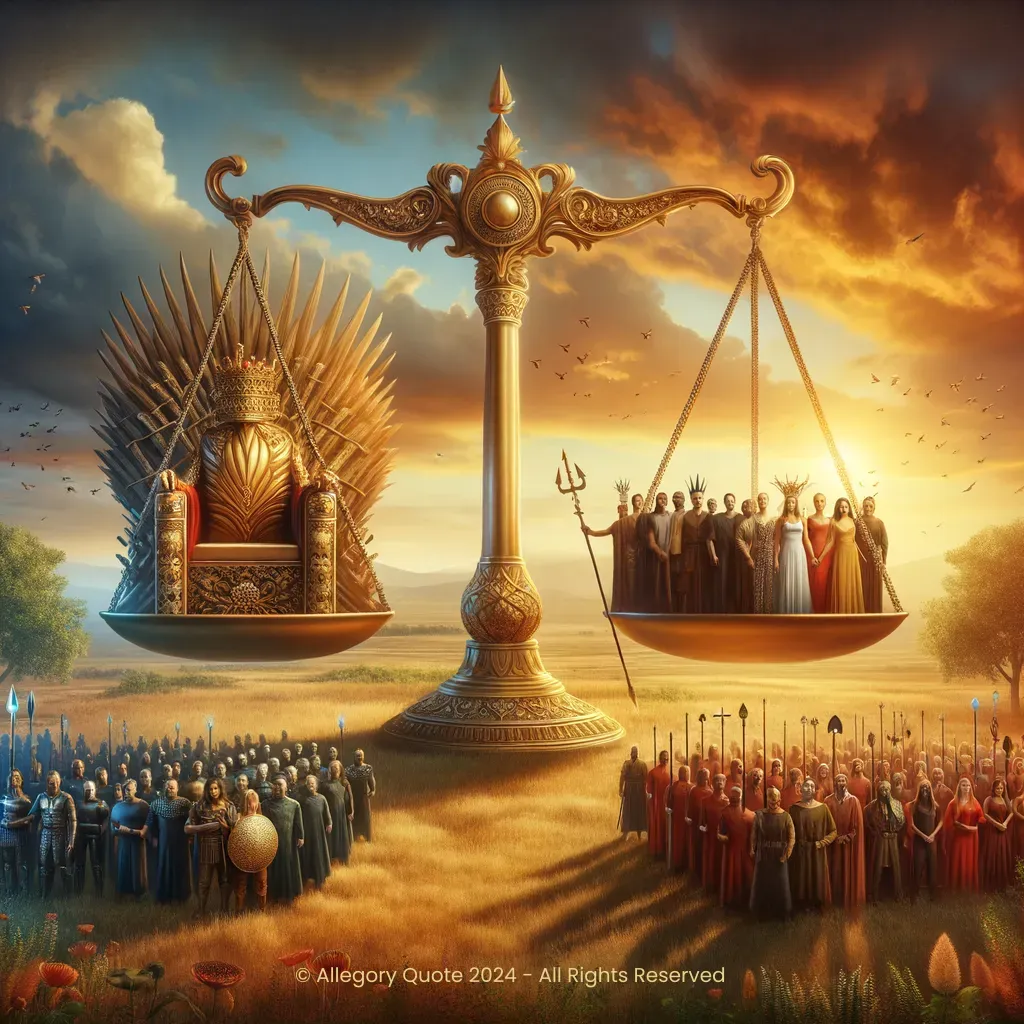”Power tends to corrupt,
and absolute power corrupts absolutely“

0
0
0
0
- Meaning
- The phrase expresses a critique of power itself and the way it can negatively influence human behavior. The central idea is that when a person or group has too much power, there is a strong tendency to exploit it for personal gain at the expense of others. This can lead to moral and ethical corruption, abuses of authority, and, in extreme cases, oppressive dictatorships. The quote emphasizes the need to balance power and have checks and balances in institutions to prevent power from becoming unlimited and dangerous.
- Allegory
- The golden throne symbolizes absolute power and its potential for corruption, while the multitude of people represents democracy and popular control. The precariously balanced scale emphasizes the delicate balance of power necessary to avoid corruption. The sunset sky with warm colors represents hope and enlightenment that come from responsibility and ethics in governance. Natural elements like trees and flowers add a touch of growth, rebirth, and harmony, indicating that fair and balanced leadership can lead to positive progress.
- Applicability
- The meaning of this phrase can be applied in various areas of everyday life. For example, in the workplace, it can suggest the importance of shared leadership and collective responsibility, avoiding a situation where one person makes all the decisions. In personal life, it reflects the importance of having a balance of power in interpersonal relationships, where no side should dominate the other completely. The phrase can also serve as a reminder for citizens to keep governments and institutions in check to prevent abuses of power.
- Impact
- This phrase has had a significant impact on political and social culture, inspiring movements for democracy and governmental transparency. It is often cited in discussions about dictatorships, authoritarian regimes, and power abuses in general. It has influenced political theory and philosophy, emphasizing the need for the separation of powers and the control of authorities.
- Historical Context
- Lord Acton wrote this phrase in a letter to Bishop Mandell Creighton in 1887, during a time when society was experiencing significant political changes and there was growing awareness of the need for accountability and transparency in government. This historical context of transformation and reflection on the powers and limits of political authority is crucial to understand the message of the quote.
- Criticisms
- There have been criticisms of the absolute interpretation of this phrase, with some arguing that not all power corrupts and that strong leadership can be beneficial if exercised with integrity and responsibility. Some might argue that corruption is more a matter of individual character rather than an inevitable consequence of power.
- Variations
- A variation of the phrase can be found in different versions, especially in religious and philosophical contexts, such as in some Buddhist or African texts, which emphasize the importance of moral and ethical leadership. However, the central concept of corruption linked to power is commonly found across different cultures.
-

The State is me.
-

Praemonitus, praemunitus.
-

He who sows the wind shall reap the whirlwind.
-

Battle not with monsters, lest ye become a monster, and if you gaze into the abyss, the abyss gazes also into you.
-

Before me every knee will bow; by me every tongue will swear.
-

Beyond the sphere that widest orbit swings, passes the sigh that leaves my heart below.
-

The unexamined life is not worth living.
-

Do unto others as you would have them do unto you.
-

He who dares wins.
-

Suspicion always haunts the guilty mind.
No Comments